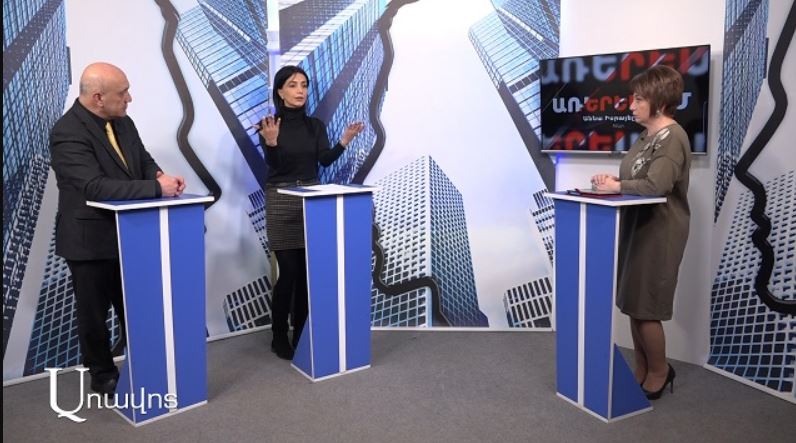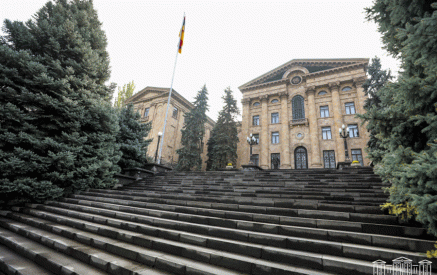“The cases of obstacles to the professional activities of media representatives, disrespectful and insulting behavior by some officials and law enforcement officers remain worrisome. As a rule, they remain inconsequential.” this is one of the records made by the “Committee for the Protection of Freedom of Speech” in the 2022 annual report on the state of freedom of speech and violations of the rights of journalists and mass media in Armenia. In this report reflecting the image of the Armenian press, there is also the following record: “In recent years, a vicious culture has been formed for the majority of officials, MPs, and ministers to communicate with journalists. They avoid answering questions and do not justify their behavior, accompanied by offensive, slang vocabulary”.
The guest of the “Aravot” “Areresum” (“Confrontation”) program, the Editor-in-Chief of “Zhoghovurd” daily Knar Manukyan, responded to the question of whether such a way of working is usual or specific to the entire course of the history of newly independent Armenia, said: “If I use my example to prove it, there have been similar manifestations in the past, but now there are more public manifestations of hatred. The limitations of our professional activities could be better. Previously, they used detaining, but now there is a worse manifestation: they are eavesdropping. I am the journalist targeted in the “March 1″ case. These authorities targeted me; they eavesdropped. It is the most shameful manifestation. If the former tried to detain me, the present arrived, including my family. There was also an attack on our media. They were calls for vigilance, but we just made a publication of interest to the public.”
The other guest of the “Areresum” program, Ashot Melikyan, the Chairman of the “Committee for the Protection of Freedom of Speech,” also mentioned that it is debatable whether the former treated journalists better or the present ones. It’s the same as saying whether onions are sweet or garlic. “Under this government, everything is fresh, that’s why it is accepted much more painfully, and that’s normal. Robert Kocharyan’s time limitations, there is no fragmentation. There are no cases in the Sari Takh/district. But we noted in the report that pressures are intolerable, regardless of the type, because they are harmful. There is no good government for freedom of speech and media activities. Every government should be fought against if it oppresses the freedom of speech openly and not openly,” Mr. Melikyan expressed his conviction.
Commenting on the fact that some of the officials speak only on the broadcasts of their preferred mass media, Ashot Melikyan noted: “It is a person’s right to decide whom to talk to, but a politician is different. No one asked him to enter the public sphere and receive attention. The official should accept that any journalist can ask a sharp question at any time. A politician should answer any quick question from any journalist calmly and decently. If he doesn’t do that, he entered the political field early, so it’s not his job, so he should be primarily interested in getting his nerves in order and acquiring communication skills. Then you can engage in politics.”
Read also
Referring to the most prominent cases of restrictions on the professional activities of journalists, Knar Manukyan noted: “During the last ten years of my work, I have not noticed a case when the possibility of moving through this or that corridor was restricted in the National Assembly. We stand in a corridor; for example, the Chief Prosecutor comes, and you look for a way to meet him and ask questions. All roads are closed. You must follow the official: “Excuse me, will you allow me to come forward and ask a question?” There has never been such a restriction in the National Assembly. We always visited the offices of deputies and prepared publications. It is his choice if the deputy does not want to speak.”
Ashot Melikyan added that he was surprised when such restrictions were introduced in the National Assembly. “Moreover, these restrictions were introduced when there was no decision. In other words, it was the result of one person’s decision. Then they only held a council meeting and adopted the decision. This was a specific restriction by this government, which had not been done before.” According to the draft amendments to the Law “On the Legal Regime of Martial Law,” it is proposed to limit the freedom of expression of opinion during martial law, to block the operation of Internet applications and websites, social networks, and others in the territory of the Republic of Armenia. For example, Zaruhi Batoyan, one of the deputies of the government that declared democracy as a brand, says that during the 44-day war, we witnessed journalists spreading content that could cause state security problems.
Knar Manukyan answers the question of whether this concern is appropriate. “The concerns are groundless. Journalists are constantly accused, and traitors are sought among them. Journalists apply to the state body but do not receive an answer, calling it a state secret. Let Mrs. Batoyan not blame the journalists. We have a code of ethics while working in wartime. It turns out that if you raise a problem, journalists are to blame.”
Ashot Melikyan slightly disagreed. “There were such publications, which also cost human lives. Some also intentionally use the situation against the government.
The second problem is that the government has done arbitrariness, hiding under the name of state secrets. Yes, there were dangerous publications during martial law, but no matter how brilliant a policeman is, he cannot decide whether a publication is panic-inducing. That is our struggle against this problem.”
More details are in the video
Anna ISRAYELYAN

























































